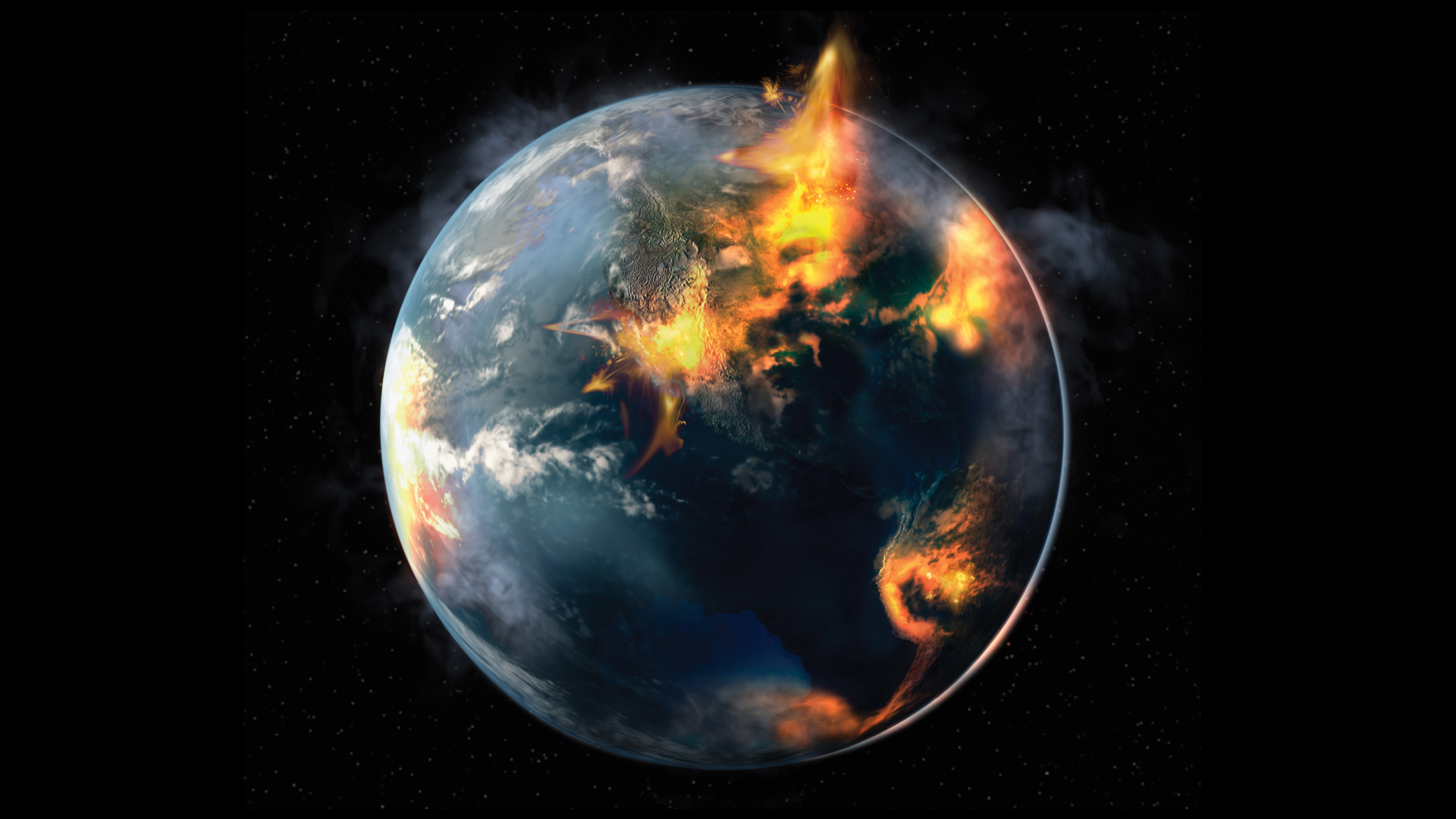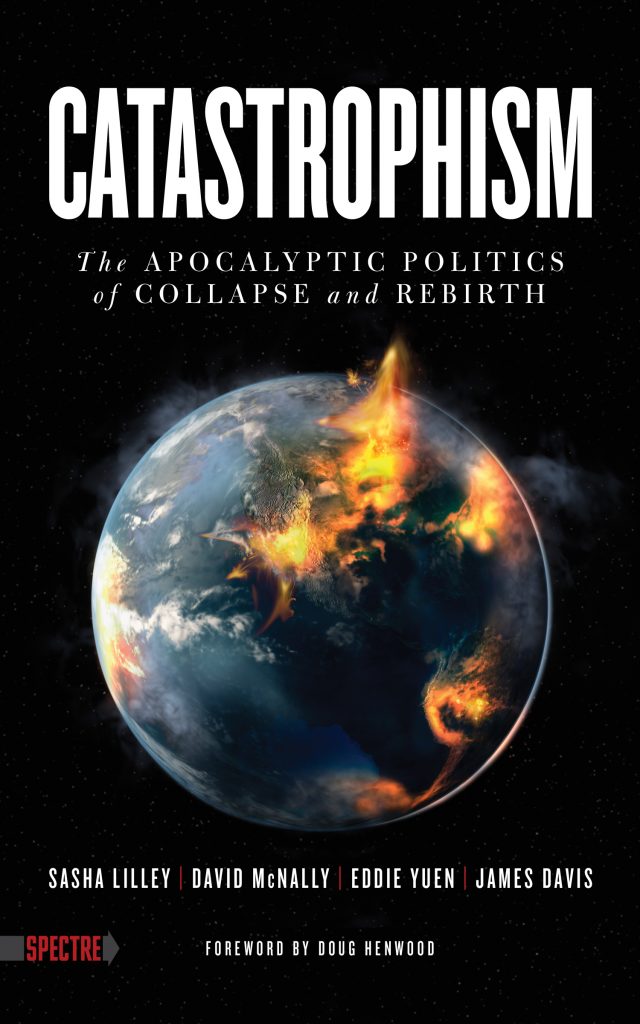By Ernesto Aguilar
Left Eye On Books
November 4th, 2012
The End Might Not be Near: A Review of “Catastrophism: The Apocalyptic Politics of Collapse and Rebirth”
Posited as an intervention of sorts, “Catastrophism” is seemingly aimed to create debate on the Left. … Its premise, that old radical ideas that destitution leads to revolution need reappraisal, deserves closer review.
With the presidential election upon us, the idea of withholding votes against Democrats has surfaced among slivers of the Left, as it does every four years. The lesser of two evils is still evil, it is asserted, and should not be supported at all, even if it means a harsher evil could take control. Yet distilling quite monumental differences on reproductive rights and scores of other matters into both Democrats and Republicans being monolithic and essentially the same is as important in some quarters as fidelity to that line.
The hard edge of such distinctions was crystallized in a recent kerfuffle in which the Freedom Road Socialist Organization (FRSO) was blasted in an online forum for claims it wanted people to vote for Barack Obama. FRSO, a Marxist group whose lineage includes bygone Maoist and Stalinist formations, was the target of 2010 FBI raids for the group’s reputed support of Colombian guerrillas. Yet FRSO seemed to have its long and extensive rebel credentials called into question over a single line about voting and swing states in a 1,300-word statement. Bizarre purism? Perhaps, but it has its adherents, on both Left and Right.
The notion that the worse society gets for people (under a Mitt Romney presidency; amid the ascent of anti-immigrant Nativism; as financial institutions crumble), the better the prospects for revolutionary politics is not a new idea. In “Catastrophism: The Apocalyptic Politics of Collapse and Rebirth,” authors James Davis, Sasha Lilley, David McNally and Eddie Yuen delve deeply into these parallel worlds. They artfully deconstruct the ideology predicting blight. Yet nowhere in the prose is there a clarion call for radicals to practice politics centered on lower expectations either. On the contrary, sharper struggle seems to be a primary encouragement. The result is an outstanding, albeit at moments disturbing and revealing, investigation not only of the neo-Nazis, survivalists and fellow travelers preparing for society’s decline but also of the marginal anarchist and quasi-Marxist tendencies anticipating popular revolts or American insurgencies.
Through film and television, both Christian and mainstream, many people are familiar with apocalyptic fantasies. As McNally , professor of political science at York University, reminds us, the cottage industry of zombie fiction and end-of-the-world horror have mushroomed in popularity. Still others have heard of conspiracy theories of forces like the Illuminati controlling the masses through all manner of machinations. In each scenario, from wild blockbuster films to little-known political theory, a cataclysmic crisis is often forecast as the spark that creates a rupture with the existing social order. In the Left milieu, Lilley, host of the radio program Against The Grain, correctly says, pining for and sometimes attempting to initiate this crisis can backfire on the Left and the environmental movement. At the same instant, catastrophism from the right wing, with its visions of assaults on the Western way of life, can often shape military and domestic policy.
Right-wing populism cooks up an ideological concoction in which the powerful, the godless and the all-seeing are closing in on our freedoms. What seems like a crude viewpoint is, as “Catastrophism” contributors remark, far more complicated than one might imagine. Cold War caricatures of work camps and groupthink mingle with fears of feminism and multiculturalism and the evisceration of “traditional values” as capital is concentrated. For the far Right, the product is a theoretical quilt in which a new Dark Age is just around the corner. The racheting up of such alarms can have horrifying consequences. A spike in hate crimes, mass killings by avowed white supremacists and the sharp rise in armed militias are among the more memorable occurrences. Quite tellingly, the image of the destruction of the American way of life through subversion has much in common with generations-old slurs against Catholicism and Judaism. This siege mentality cultivated by the Right, notes documentary filmmaker Davis, is happening in spite of capital’s seeming victory, with the virtual decimation of unions and workers’ rights, the gutting of social welfare programs, slashing of taxes for the wealthy and ascendance of quality-of-life policing espoused by the likes of former New York City Mayor Rudy Giuliani among other things. This is in part because hegemony is often more critical than markets.
On the Left, particularly for the branch predicting social collapse via economic calamity, a similar affliction stunts progress. Faith that “heightening the contradictions” will create conditions for a mass movement or violent thousands-strong uprising against the status quo has long been an assumption that never really materialized. As many students of history saw with the Weather Underground Organization and other outfits, hoping to foment the revolution through random and even calculated targeting never monumentally changed the course of capital either. In truth, such suggestions, including in the radical environmental vein, take on an almost misanthropic veneer, where people are simply assumed as sleeping, unaware and merely needing a shove in the correct direction. Why those approaches were and still are wrong, and why political engagement is necessary are central themes here. A more sophisticated reading of history and theory, among other imperatives, are necessary, the authors reason. No level of retreat awaiting capitalism’s demise can replace grassroots struggle and community organizing for broad change.
“Catastrophism”‘s authors observe that the idea of capitalism’s and imperialism’s stretched resources and ultimate failure have held sway in the radical imagination since at least the 1800s. This sort of presentation is often paradoxical: glum forecasts of tuition cuts, foreclosures and collaborations between politicians on both sides of the aisle compete with claims capitalism’s crash is near and exhortations for a revolution that its organizers have no material basis in influencing let alone leading. On the Left, the idea that deepening social rifts and institutional failure to serve people’s needs will prompt a turn to radical politics seems a fixture in nearly every movement. Nowhere is such positioning as prominent as the environmental movement, where extinction for species, the landscape and humanity seems to always loom. However, as Yuen, author of “Confronting Capitalism” shares, the romance with terrifying imagery and vague solutions has inspired little more than hopelessness and certainly not a broad anti-capitalist commitment to mass organization. The truth is that capitalism is evolving constantly, and those with revolutionary hopes must as well.
Posited as an intervention of sorts, “Catastrophism” is seemingly aimed to create debate on the Left. And those interests in contemporary Left history are sure to be avid readers. Its premise, that old radical ideas that destitution leads to revolution need reappraisal, deserves closer review. Lilley and company provide much to digest in an excellent book sure to challenge some long-held political contentions.
Ernesto Aguilar is a media professional and writer based in Houston, Texas. He is a contributor to the books “The Accumulation of Freedom: Writings on Anarchist Economics“ and the forthcoming “The End of Prisons“.
Back to Sasha Lilley’s Author Page | Back to David McNally’s Author Page | Back to Eddie Yuen’s Author Page | Back to James Davis’s Author Page







